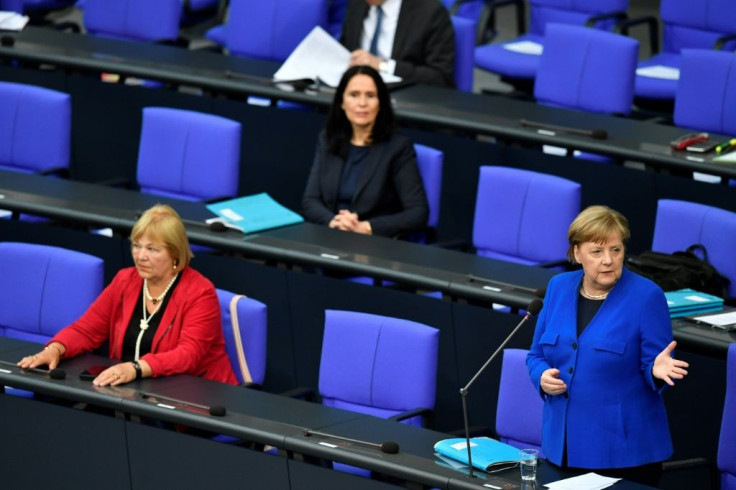Merkel Urges Euro Integration As Judges Defend Shock ECB Ruling

Chancellor Angela Merkel said Wednesday that a bombshell ruling on the European Central Bank by Germany's top court should "spur" efforts toward greater the integration as judges defended the shock decision.
Speaking to parliament, Merkel said euro leaders should do more to strengthen the single currency area instead of leaving the central bank to do the job alone.
"The important thing now is to act responsibly and cleverly so the euro can and should and will continue to exist," she told MPs when asked about the judgement last week questioning massive ECB bond purchases.
"It must indeed spur us on to do more in the area of economic policy to advance integration (of the eurozone)."
In its bombshell ruling last week, Germany's Constitutional Court questioned the ECB's bond-buying scheme, which has been credited with powering eurozone growth after the 2008-9 financial crisis.
The judges in Karlsruhe gave the ECB three months to justify the stimulus and show that the benefits of mass government debt purchases outweigh the side effects.
Otherwise, the judges said they will ban Germany's powerful Bundesbank central bank from participating in the two-trillion-euro scheme.
Merkel said that 240 billion euros ($260 billion) in credit lines approved last week to help European countries meet the crippling costs of fighting the coronavirus outbreak were just the first big step in such a drive.
Under the deal, every country in the 19-member single currency union can take advantage of low-interest loans worth up to two percent of its economic output.
The agreement now has to be approved by some member states' parliaments, including the Bundestag in Germany, Merkel noted.
"This is about European solidarity and the stronger Europe's answer in this context is, the better the European Central Bank will be able to do its job," Merkel said.
She said that its was clear since the euro's inception that greater political coordination among its participant countries was essential.
"We must not forget what (former European Commission president) Jacques Delors said before the euro was introduced: we need a political union -- a monetary union alone won't be enough," Merkel said.
In a rare move and in the face of serious blowback from EU institutions, the lead judge in the German court case, Peter Huber, had earlier pushed back against criticism of the ruling, saying that the ECB must know its place.
"It should not consider itself the 'master of the universe'," he said in an interview in Wednesday's Sueddeutsche newspaper.
"All we ask of the ECB is that it accepts its responsibility in the eyes of the public and also justifies it -- including towards people who are disadvantaged by its measures."
Meanwhile the outgoing chief justice of the court, Andreas Vosskuhle, insisted that the German judges had the eurozone's best interests at heart.
"We are convinced that this is a good decision for Europe because it strengthens the ties to the rule of law. You will see that in the medium- and long-term," he told Die Zeit weekly.
"We see that our verdict upset a lot of people and that doesn't make us happy. But we are obliged to uphold the law."
He denied that the German court was putting itself above the European Court of Justice (ECJ), but dismissed the notion that the European tribunal should always have the last word.
National constitutional courts "are justified and obligated to intervene in rare exceptional cases of especially grave violations of European institutions' authority."
The Constitutional court in its ruling also slammed the Luxembourg-based ECJ for rubber-stamping the asset purchases in an earlier ruling and said Germany was not bound by the ECJ decision.
The decision drew a furious reaction from the EU, which insisted that European law trumps that of member states.
European Commission chief Ursula von der Leyen has also raised the spectre of legal action against Germany.
© Copyright AFP {{Year}}. All rights reserved.





















